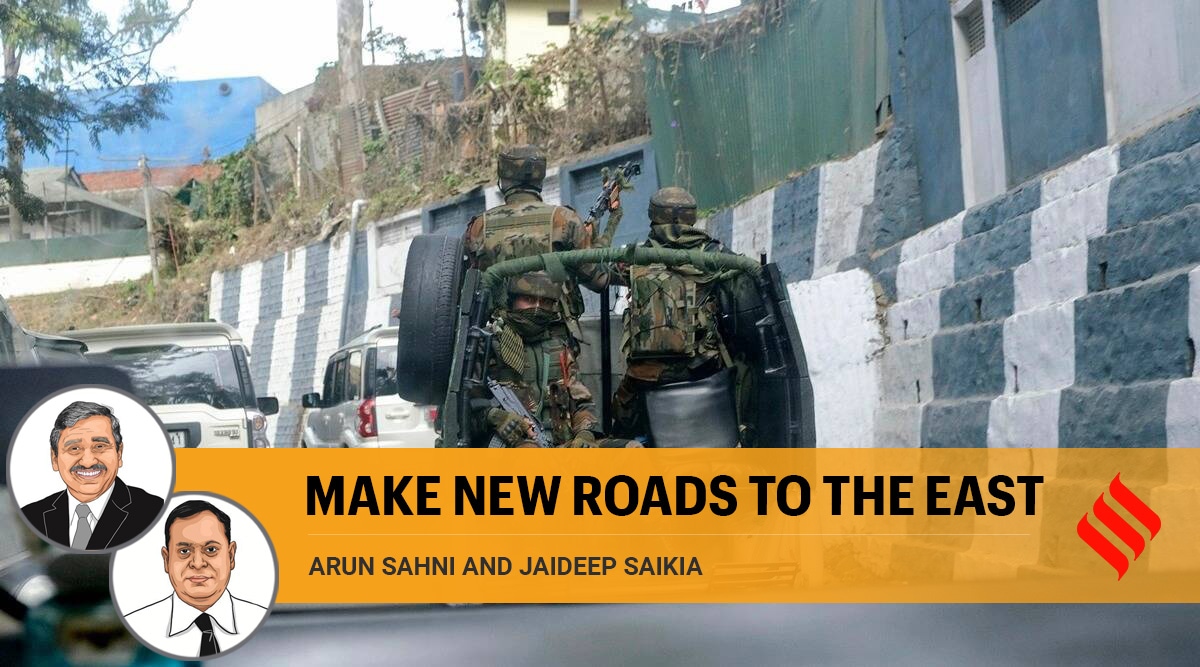 While New Delhi may contemplate at leisure the innumerable faux pas it has committed, pragmatism demands that an ambitious policy that had fired the aspirations of the Northeast does not become a casualty to the inertia of policymakers. (AP/file)
While New Delhi may contemplate at leisure the innumerable faux pas it has committed, pragmatism demands that an ambitious policy that had fired the aspirations of the Northeast does not become a casualty to the inertia of policymakers. (AP/file)Even a cursory look at the situation in Myanmar, post the February 1, 2021, military takeover, conjures up a picture of a country that is spiralling downwards. There are reliable reports of the strengthening of the People’s Defence Force, with the support of various ethnic militias. There is no sign of the restoration of normalcy as witnessed by one of the authors during a recent tour of the India-Myanmar border. For India, the putsch and its aftermath have seen an adverse impact on its Act East policy, which had since 2014 become more dynamic and result-oriented. With the present dispensation in Myanmar, the Act East policy is going nowhere. This has not only stymied New Delhi’s initiatives in terms of land outreach towards the vibrant economies of South East Asia, but has retarded development in the Northeast.
While New Delhi may contemplate at leisure the innumerable faux pas it has committed, especially after the putsch, pragmatism demands that an ambitious policy that had fired the aspirations of the Northeast does not become a casualty to the inertia of policymakers. This ambivalence has led to a series of unfortunate incidents that indicate a resurgence in anti-India posturing in the region. There seems to be a full-bodied recalibration exercise among insurgent groups operating from the Sagaing Division and Chin State in Myanmar. Elsewhere, in the north, the ULFA which was until recently in a submissive mood and had declared three back-to-back unilateral ceasefires has suddenly turned belligerent. And in May, it “executed” two suspected cadres, as spies of Assam Police. This is creating impediments to the Centre’s overtures for future peace initiatives. Also, reports of meddling by Chinese intelligence in supporting these militant groups are of concern and demand proactive action.
It is in this background that a fresh look needs to be taken at both the furtherance of the Act East policy, as well as the security matrix that governs the Northeast. The following is recommended :
First, favourable bilateral relations with Bangladesh, under Sheikh Hasina, offer an opportunity for opening a new axis of land-sea connectivity for promoting trade and commerce with Southeast Asia. There is a need to upgrade the multitude of land routes to the seaports of Mongla and Chittagong in Bangladesh, from Assam, Meghalaya, Mizoram and Tripura. The key land linkages from the Northeast are — Agartala via Akhaura, Dawki (Meghalaya) via Tamabil, Sutarkandi (Assam), and Srimantapur (Tripura) via Bibir Bazar. In addition, there is a need to use inland water transport (IWT) to exploit the shared river connectivity of the Brahmaputra and Barak rivers. These have been used earlier to move large machinery for the Palatana power station in Tripura from Chittagong port and for the transit of heavy barges and ships for repairs/maintenance ex Assam, through Bangladesh to the shipyards at Kolkata. The pandemic and the Russia-Ukraine conflict have further disrupted the existing supply chain linkages and this has created prospects for developing fresh trade linkages with the nations of Southeast Asia and the far east, on priority.
Best of Express Premium
Second, the land gateway to South East Asia through the morass of the “killing fields” of Myanmar, does not seem likely in the near future. But there should be no dilution in our initiatives to ensure that peace and stability return to Myanmar at the earliest. For this, there is a need for continued engagement, both formal and informal, with the warring factions in Myanmar.
Third, appropriate infrastructure such as container depots, cold storage facilities and seamless highways will have to be developed on a war footing. Indian manufactured goods will have to be transported to the rail/roadheads in the Northeast like Guwahati for ready access to the seaports of Bangladesh.
Fourth, there is a need to raise an empowered department for monitoring and facilitating projects that support India’s Act East policy, transcending all critical Ministries like Home, External Affairs, Industry, Surface-River Transport, etc.
Lastly, to defang the strike capability of the insurgent groups there is a need to create “integrated defence zones”. These should be jointly manned by the Tatmadaw (Myanmar army) and the Indian Army/Assam Rifles. This force should dominate the 16-km belt of the “free move regime” on the Myanmar side of the border. Such a forward engineering exercise would not only enhance security but also provide sustenance to the locals and promote goodwill. To enthuse dynamism and empower the Assam Rifles, there is a need to retain its current structure of being officered by the Indian Army, as it ensures systemic command and control. This force needs to be mandated to undertake intelligence operations for greater transparency of the events within Myanmar and further the national strategy.
The Act East policy is intertwined with India’s Northeast policy. Let not the dismal scenario of Myanmar impede our vision for the actualisation of our ambitious Act East to go East, as alternates exist. To that end, there is a need to ensure the continued economic development of Northeastern states. Positive overtures by the Government of India will not only improve the security situation but reassure the locals that the region’s interest is paramount and kickstart the stalling economic outreach to the east.
(Sahni is a former General Officer Commanding-in-Chief of the Indian army’s South Western Command. Saikia is a conflict analyst and author.)
- The Indian Express website has been rated GREEN for its credibility and trustworthiness by Newsguard, a global service that rates news sources for their journalistic standards.

